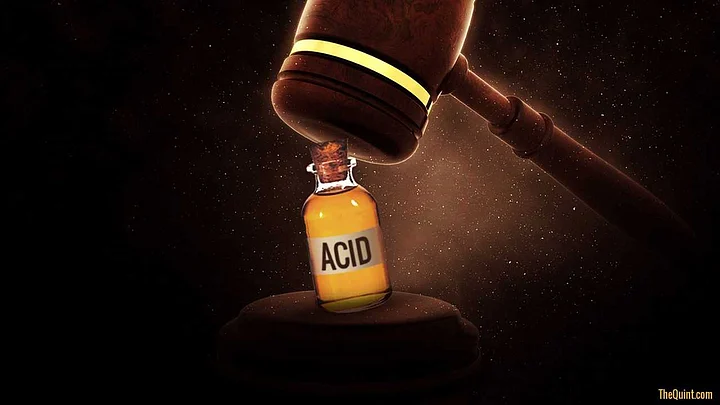The Uttarakhand High Court has opened a Pandora’s Box for the Indian judicial system with its recent move directing the state’s trial courts to fast track acid attack cases.
The division bench, comprising Justices Rajiv Sharma and Sharad Kumar Sharma, stated that such cases, along with those pertaining to sexual harassment, stalking and voyeurism, need to be heard on a daily basis and concluded within three months.
Can Fast Counter the Furious?
Data suggests that such directions in the past have significantly improved the justice delivery system. Conviction rate figures in the public domain do not segregate the outcomes of fast trials from those of regular trials. However, senior women’s rights lawyer, Flavia Agnes, has serious doubts about fast track trials.
There’s a presumption that fast-tracking of a trial results in securing conviction. My experience tells just the contrary.
On acid attack cases, Agnes says, “It is difficult to conclude the trial in three months because the victim may need more time to recuperate from the injuries. Even if the charge-sheet is filed in time, the victim may not be in a position to comply with the judicial process.” Low conviction rates in such trials remain a problem.
Madhur Verma, DCP (Crime) and the PRO of Delhi Police, however, is optimistic about fast track trials.
Fast tracking of trials is a good idea as there is lesser chance of witnesses defecting. Since the incident is still fresh, the process of testifying and cross-examination goes more smoothly. The chances of witness intimidation are also reduced. Overall, the prosecution benefits.
Only 473 Fast Courts For 120 Crore+ People?
A debate on conviction rates, however, appears premature in a scenario where the courts are grossly overburdened.
The first challenge is to ensure that the courts have enough time for hearings. After the 11th Finance Commission recommendations, 1,734 Fast Track Courts (FTCs), jointly funded by the central and state governments, were approved in 2000. Their purpose was to lessen the burden of pendency in the district and subordinate courts. The central government stopped funding the FTCs in 2011, and as per the latest available data, only 473 FTCs are functional across the country owing to the apathy of the state governments.
Uttar Pradesh, one of the worst offenders in this regard, with only 80 functional FTCs against the approved 242, is now mulling setting up 100 fast track courts for crime against women. Incidentally, Uttar Pradesh recorded 147 acid attack cases, the highest in the country, between 2011 to 2015. Most acid attacks are gender-skewed, with the majority of the victims being women.
Speed Bumps
Infrastructural roadblocks – from inadequate number of judges to non-existent court buildings – severely hamper the speed of trials in the country.
In view of this, the Uttarakhand HC order needs to be applauded and seen in compliance with the March 2017 Supreme Court order. A bench of Justices AK Goel and UU Lalit had then said:
Speedy trial is a part of reasonable, fair and just procedure guaranteed under Article 21. This Constitutional right cannot be denied even on the plea of non-availability of financial resources.
The Supreme Court bench had then stated that the court is “entitled to issue directions to augment and strengthen” necessary facilities to equip itself for speedy trial in criminal cases. The right to a speedy and fair trial is a fundamental right of the accused as per Article 21 of the Constitution. Cases concluded in a stipulated time-frame, therefore, benefit both the accused and the victim.
Long Road to Justice
The said time frame can only work when the lower judiciary beyond metros is watched closely, says Swaty S Malik, a lawyer practising in New Delhi.
There are examples of judges writing four-page judgments sitting in their drawing rooms in smaller cities. One one hand, there are conscientious judges who are badly overburdened, on the other, there are those that find no time to do the work they draw salaries for.
Malik shares the dismal state of Delhi-NCR courts, where more than 70 cases are waiting to be heard in five working hours every day.
“One criminal case needs at least 20 hearings and most get the next hearing after three months because of the sheer volume of cases. It means minimum 60 months to close a case. Why can’t we have more judges to hear the cases? Even in the Delhi HC positions are vacant despite the latest appointment of four judges,” she says.
With the Parliament passing The Rights of Persons with Disabilities Bill in 2016, acid victims are now entitled to get disability benefits through various government policies and schemes.
Hopefully, fast-tracked trials resulting in conviction shall bring closure to people whose lives are disfigured with acid.
(This admission season, The Quint got experts from CollegeDekho.com on board to answer all your college-related queries. Send us your questions at eduqueries@thequint.com.)
(At The Quint, we question everything. Play an active role in shaping our journalism by becoming a member today.)
